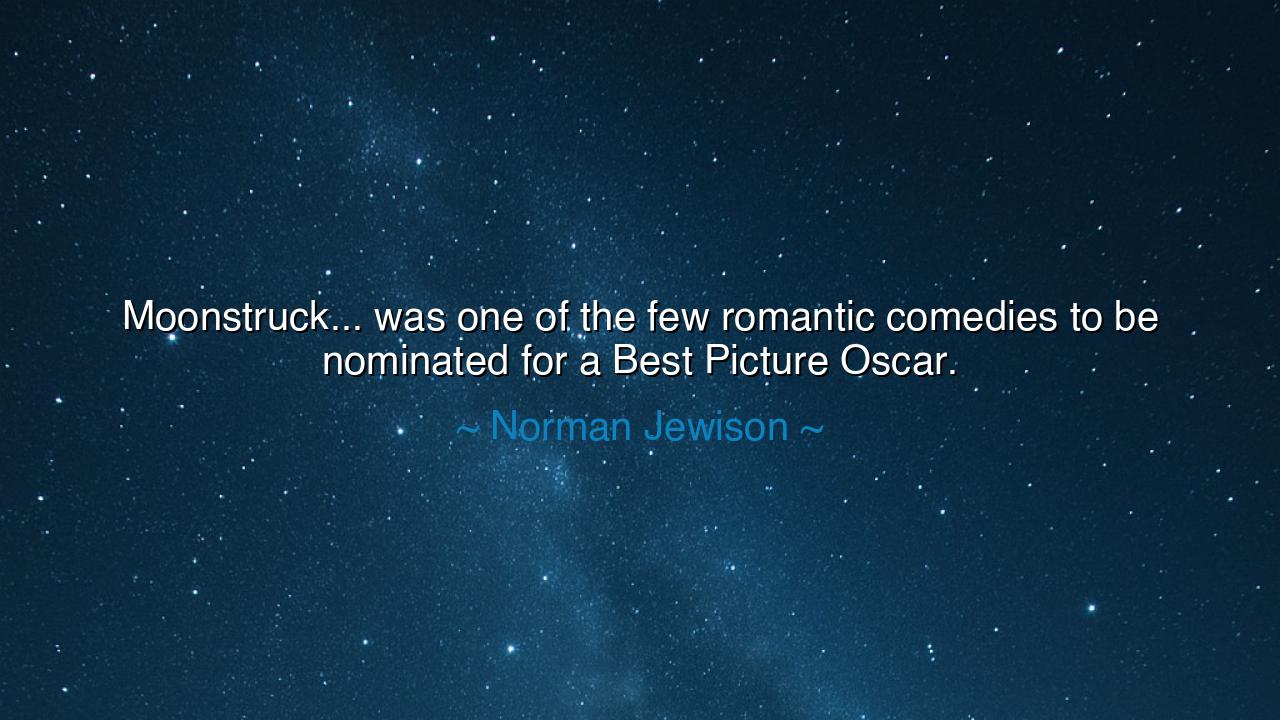
Moonstruck... was one of the few romantic comedies to be
Moonstruck... was one of the few romantic comedies to be nominated for a Best Picture Oscar.






Come, O seekers of wisdom, and listen to the words of Norman Jewison, who reflects upon the unique place that Moonstruck holds in cinematic history: "Moonstruck... was one of the few romantic comedies to be nominated for a Best Picture Oscar." In this statement lies a profound observation on the nature of romantic comedy as a genre—a genre often dismissed as light or frivolous, yet one that carries deep, universal truths about love, life, and the human condition. Moonstruck defies expectations, elevating the romantic comedy to the realm of art, where it is not just a simple diversion, but a reflection of the complexity and richness of human emotion. Its recognition by the Academy speaks to the power of love as a force that can transcend the limitations of genre, revealing the depth of our shared humanity.
In the ancient world, love was seen as both a divine gift and a transformative force that shaped the course of human existence. Greek mythology is filled with tales of romantic relationships that were anything but simple. Take, for example, the story of Orpheus and Eurydice, whose love was so profound that it transcended even the boundaries of life and death. Their story, filled with passion, loss, and yearning, is one of the greatest tragedies of the ancient world. In a way, the tale of Orpheus parallels the core of romantic comedies like Moonstruck—love that is both transformative and, at times, challenging. Moonstruck, though comedic in its tone, shares this depth of emotion; it showcases the complexities of human relationships in a way that elevates the genre, making it something more than just fluff.
Jewison’s words suggest that romantic comedies, though often lighthearted, can carry profound meaning when executed with heart and authenticity. Moonstruck is not just about the comedy of romantic misadventures, but about the real struggles of the heart: family dynamics, self-discovery, and the tension between independence and connection. The film explores the messy, imperfect nature of love—how it often arises in unexpected places and requires sacrifice and growth. The magic of Cher’s performance as Loretta and Nicolas Cage’s as Ronny lies in their ability to express this unpredictable, life-altering force that love can be. Their characters experience love as a challenge, a revelation, and ultimately, a deep transformation, not just for themselves, but for those around them.
The romantic comedy genre, in many ways, is built upon the conventions of storytelling—two characters meet, they fall in love, face obstacles, and ultimately reconcile. Yet, what sets certain romantic comedies apart, like Moonstruck, is their ability to transcend these conventions, offering something more substantial and relatable. Like the tragedies of old, where love’s power is tested by external forces, Moonstruck presents a love story where the characters grow through conflict, self-awareness, and a reaffirmation of their desires. This is the essence of great storytelling, where the journey itself, no matter how comedic, is transformative for the characters involved. It reminds us that love is not always easy, nor is it always predictable, but it is always worth the struggle.
Consider the ancient epic of Homer’s Odyssey, where Odysseus embarks on a journey fraught with perils, but it is his love for his wife, Penelope, that ultimately drives him home. His struggle, though filled with external challenges, is ultimately a search for reunion with his love and family. Like Odysseus, the characters in Moonstruck are on their own journey—one that explores identity, family, and romantic connections. In the end, Loretta, much like Penelope, must navigate the complexities of her desires and commitments, learning that true love often requires more than just passion—it requires self-realization, compromise, and a deep commitment to those we hold dear.
Thus, O wise ones, we learn from Jewison’s reflection that love, whether in its comedic or tragic form, is one of the most powerful forces in human experience. Romantic comedies, despite their reputation for being light or inconsequential, offer us a chance to explore deep human emotions through humor and tenderness. Just as the great epic poets used myth to examine the human condition, so too does Moonstruck explore love’s complexity, making us laugh, cry, and ultimately reflect on the relationships that shape us. Romantic comedy, when executed with wisdom and sincerity, can be as transformative as any other genre of storytelling.
Take this wisdom into your own life, O travelers: do not dismiss the power of humor or romance. These forces have the ability to touch the soul, to heal wounds, and to transform lives. Seek to find joy and meaning in all of your relationships, whether they are romantic, familial, or platonic. Allow love to be your guide—not in its idealized or perfect form, but in its realness, its imperfection, and its capacity to bring growth, understanding, and connection. Like the characters of Moonstruck, you too may find that love, in all its messy and unpredictable beauty, is one of the greatest forces in the human experience, and that even in comedy, there lies profound truth.






AAdministratorAdministrator
Welcome, honored guests. Please leave a comment, we will respond soon